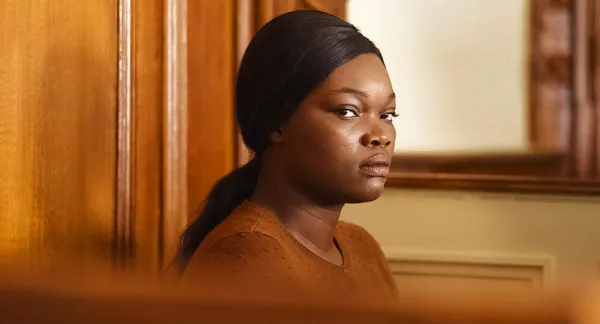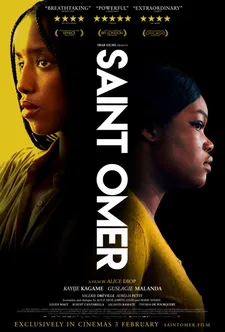 |
| Guslagie Malanda: "Much of the script was based on what she had actually said in court and learning those lines was one of the most visceral experiences of my life." Photo: UniFrance |
The awards buzz around documentary filmmaker Alice Diop’s first narrative feature, Saint Omer (named after the French town where it is set), continues to grow ahead of the BAFTAs and the French Césars. The film already has won the Silver Lion and Luigi de Laurentiis Award for Best Début Film at the Venice International Film Festival. Although chosen to represent France in the Oscars race as Best International Feature, a first for a black woman filmmaker, it failed to make the final mix of five nominees.
It was possibly simply too gritty for the sensibilities of the Academy Award voters in Hollywood. Set mainly in a court-room in a Northern provincial town, it sees Diop employ her skills to explore a trial that she attended as an observer in 2016, dealing with a Sengalese woman (Guslagie Malanda) accused of murdering her 15-month-old child.
 |
| Kayije Kagame: "I was pleased to be able to take on such a complex subject, especially with a director who had such a rigorous point of view on the matter.” Photo: UniFrance |
Rama, a character based on Diop herself and played by Kayije Kagame, is a pregnant writer who watches the proceedings and begins to experience anxiety about her impending motherhood.
Diop has said that she felt in this case fiction was “the only way for me to tell this story.” Fiction allowed her to go much further into the question of maternity.
She wrote the film with her two principal actors, Malanda and Kagame, in mind, even although she had not confirmed their participation. Malanda said: “We started the preparatory work about a year before the filming began yet the director had not told me for sure that I had got the part. For me as an actress it seemed like a year of the casting process and I was in a perpetual state of waiting. It was almost 12 months of working on the psychology of the role - this woman who had abandoned her baby on the beach, leaving the infant to drown.”
The woman upon whom her character is based remains in prison serving her sentence. Malanda did not want to meet her. “Finally I did meet her in a way through the text written by Alice. Much of the script was based on what she had actually said in court and learning those lines was one of the most visceral experiences of my life. Her words became mine. I think that in the end was a much deeper way of getting to know her than simply meeting her in person. I think my gut reaction was the right one: that by not trying to imitate her I got to the truth of who she was.”
Similarly Kagame, a Swiss actor that Diop had spotted when she had asked a question during a discussion following the screening of one of the filmmaker’s documentaries, did not know anything about the case before she was offered the role. “I was pleased to be able to take on such a complex subject, especially with a director who had such a rigorous point of view on the matter,” she said.
 |
| Saint Omer poster |
Both actors concur that they sense a resurgence in French cinema in confronting these kind of stories from the margins, and that women directors in particular feel empowered to tackle them “without having to ask ‘permission.’”
Malanda thought long and hard before accepting the role, realising that the journey would be difficult. She said: “I limbered up for the part a bit like an athlete. I didn’t want an acting coach to assist me but I did hire a tai chi master to help me with the pronunciation of the words and to show me how to breathe inside each sentence. We worked on that which was very intense, a bit like meditation.”
She finds that the good roles for actors of colour are few and far between. “It’s difficult to get roles, especially leading ones. Your role is already determined in a way, sometimes good and sometimes bad, by your skin colour. It’s not the same thing for white people who can have roles that aren’t necessarily connected to skin colour. I am extremely demanding in what I do - if I was less strict with myself I might have far more titles in my filmography but that’s not my way!”
Kagame flashes a smile of agreement. “I’ll go with what she says - one hundred per cent!”
Saint Omer is on UK and Ireland release from 3 February. Other dates follow: Netherlands (9 Feb); Spain (3 March); Germany (9 March); Norway (10 March); Rumania (2 June).
Richard Mowe talked to Guslagie Malanda and Kayije Kagame at the Unifrance Rendezvous with French Cinema in Paris last month.
























